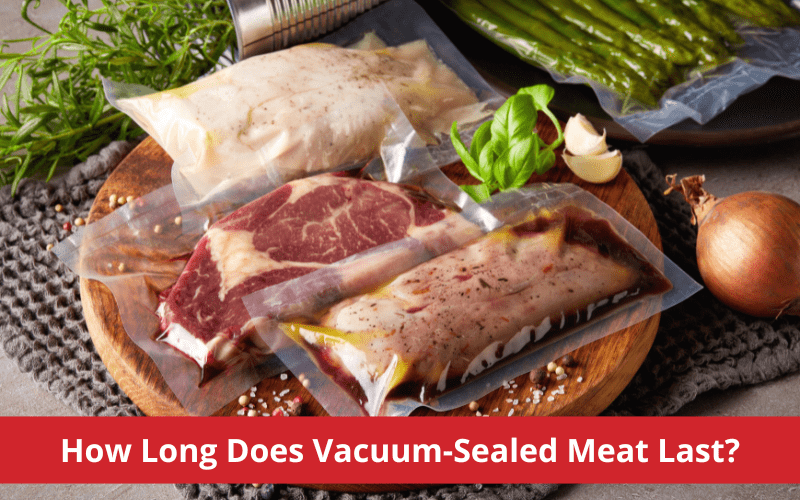Do you love buying meat in bulk when it goes on sale? If so, you’ll want to know how long does vacuum-sealed meat last. The answer may surprise you! Vacuum-sealed meat can last for up to a year in the freezer. That means you can buy it when it’s on sale and have plenty of time to use it all before it goes bad. Keep this information in mind the next time you’re at the grocery store!
How long does vacuum-sealed meat last in the fridge?
While it is not possible to give an exact answer as to how long vacuum-sealed meat will last in the fridge, as this will depend on a number of factors such as the type of meat, how it has been packaged, and how cold your fridge is, as a general rule it will last around three to four days.
Vacuum-sealing meat can help to keep it fresh for longer, as it removes the air from the packaging which can cause bacteria to grow. If you are not going to eat the meat within a few days, it is best to freeze it so that it will last for several weeks.
How long does vacuum-sealed meat last in the freezer?
The life of vacuum-sealed meat in the freezer can depend on a lot of factors, but in general, it can last quite a while. How long exactly depends on the thickness of the meat, how well it was sealed, and how cold your freezer is.
As a general rule, however, vacuum-sealed meat can last six to twelve months in the freezer. That said, if you’re ever unsure about whether or not meat has gone bad, it’s always better to be safe than sorry and throw it out.
How long does vacuum-sealed meat last once open?
The answer to this question largely depends on the type of meat that is being vacuum-sealed.
- Beef, pork, and lamb typically last around three to five days after being opened, while poultry can last for up to two weeks.
- Seafood is the exception, as it typically lasts for only a day or two after being opened.
This is because seafood is high in moisture content, which bacteria thrive on.
How long does vacuum-sealed salami last in the fridge?
Salami is a type of cured sausage that is usually made from pork, beef, or venison. It is a popular lunchmeat, and can also be used as an ingredient in other dishes.
There are many different varieties of salami, and it can be enjoyed both cooked and uncooked. Salami is vacuum-sealed and sold in either sliced or whole form. It is typically stored in the fridge and has a shelf life of around two weeks.
How long does vacuum-sealed food last at room temperature?
The shelf life of vacuum-sealed food at room temperature can vary depending on the food item. Typically, most vacuum-sealed food will last between three and five years.
However, some items, such as beef or pork, can last up to 10 years when vacuum-sealed. It is important to note that the quality of the vacuum-sealed food will degrade over time, so it is best to consume it as soon as possible.
What is the best way to store vacuum-sealed meat?
When storing vacuum-sealed meat, it is best to place it in a refrigerator or freezer. If you are going to store the meat in a refrigerator, make sure to put it in a location that is as cold as possible.
This will help keep the meat fresh for as long as possible. If you are going to store the meat in a freezer, make sure to freeze it as quickly as possible. This will help keep the quality of the meat high.
What kind of meats can be vacuum sealed?
There are a wide variety of meats that can be vacuum sealed.
- Beef, pork, lamb, and poultry are all common options.
- Fish can also be vacuum sealed, although it is typically recommended that this be done shortly after purchase in order to minimize the risk of bacteria growth.
- Some types of meat, such as ground meat or fish, should not be vacuum sealed for more than a few days.
Vacuum sealing is a great way to store meat for long periods of time, as it helps to prevent freezer burn and keeps the meat from becoming contaminated.
Can you freeze raw meat after vacuuming it?
Can you freeze raw meat after vacuuming it? In short, the answer is yes. Meat that has been vacuumed can be frozen without any ill effects. In fact, freezing meat that has been vacuumed can actually help to extend its shelf life.
When you freeze meat that has been vacuumed, the air is expelled from the meat. This not only helps to prevent freezer burn but also slows down the rate at which the meat spoils.
So, if you have a lot of meat that needs to be frozen, vacuum-sealing it before freezing is a great way to do it. Just be sure to use a quality vacuum sealer and high-quality bags or containers, as poor-quality materials can lead to freezer burn and other spoilage issues.
Can you re-seal a bag of meat that has been opened before freezing it again?
No, you should not re-seal a bag of meat that has been opened before freezing it again. Once the bag has been opened, bacteria can enter and contaminate the meat. Freezing the meat will not kill the bacteria, so you would be putting yourself at risk of food poisoning by eating the meat.
If there’s air in the bag, will the meat still be safe to eat?
There is a lot of debate surrounding this topic, with many people asserting that if there is even a small amount of air in the bag, the meat will be unsafe to eat.
Others claim that as long as the meat is not exposed to the air for an extended period of time, it will be fine. The general consensus seems to be that if there is air in the bag, it’s best to just throw the meat away. However, if you are really determined to eat it, cook it until it is well done.
See more: What Is Different Between Pork Shoulder Vs Pork Butt?
How to tell if vacuum-sealed meat is bad?
If you are unsure whether vacuum-sealed meat is bad, there are a few ways to check.
- One way is to smell the meat. If it smells off or rancid, then it is likely bad and should not be eaten.
- Another way to check is to look at the meat. If it is discolored or has any sort of slimy coating, then it is likely bad and should not be eaten.
- Finally, you can taste a small piece of the meat. If it tastes sour or metallic, then it is likely bad and should not be eaten.
If you are uncertain about whether or not the meat is bad, it is best to discard it.
How long do vacuum-sealed vegetables last in the freezer?
The answer to this question depends on a number of factors, including the type of vegetable and how it was stored before freezing. Generally speaking, most vacuum-sealed vegetables will last for six to eight months in the freezer. However, certain vegetables may last for longer or shorter periods of time, depending on their characteristics.
- One important thing to remember when freezing vegetables is that they should be blanched first.
- Blanching is a process that involves boiling vegetables for a brief period of time before freezing them.
- This helps to preserve their flavor and color, and it also helps to keep them from becoming mushy when they are thawed.
If you are unsure of how to blanch your vegetables, consult a trusted recipe or online tutorial. Once your vegetables have been blanched, it is important to quickly cool them down before freezing them.
2. One easy way to do this is by using an ice bath.
- Simply place your blanched vegetables in a large bowl or container and fill it with ice water. Stir the vegetables until they are covered with ice cubes and let them sit for about two minutes.
- Drain the water and place the vegetables in a sealable bag or container. Make sure to remove as much air as possible before sealing the bag or container.
If you follow these simple steps, you can enjoy fresh, nutritious vegetables all year round!
How long does vacuum-sealed cake last?
The shelf life of vacuum-sealed cake is typically around two weeks, but it can last up to a month if stored in a fridge. The cake will be dry and crumbly if it is stored for too long.
How long can vacuum-sealed chicken last at room temperature?
The answer to this question largely depends on the quality of the seal and how fresh the chicken is when it is packaged. Chicken can typically last for two to four days at room temperature if it has a good seal, but it will start to spoil after that. If the seal is broken or if the chicken is not fresh, it will only last for a day or two.
How long does vacuum-sealed fish last at room temperature?
The answer to this question is not a straightforward one, as the lifespan of vacuum-sealed fish depends on a number of factors, such as the type of fish, the packaging material, and the storage conditions. However, in general, vacuum-sealed fish can last for several days at room temperature if the packaging is intact and there is no evidence of spoilage.
Under optimal conditions, vacuum-sealed fish can last for up to two weeks. However, if the fish has been frozen prior to being vacuum sealed, it will last for significantly longer – often up to six months.
Additionally, if the vacuum seal is broken and air enters the package, the fish will spoil more quickly. For these reasons, it is important to inspect vacuum-sealed fish carefully for any signs of spoilage before consuming it.
Conclusion
When it comes to how long does vacuum-sealed meat last, the answer is that it depends. The type of meat, the thickness of the seal, and how it’s stored all play a role in determining shelf life. However, you can usually expect vacuum-sealed meat to last twice as long as meat that hasn’t been sealed. So, if you’re looking to extend the life of your meat, consider investing in a vacuum sealer.

